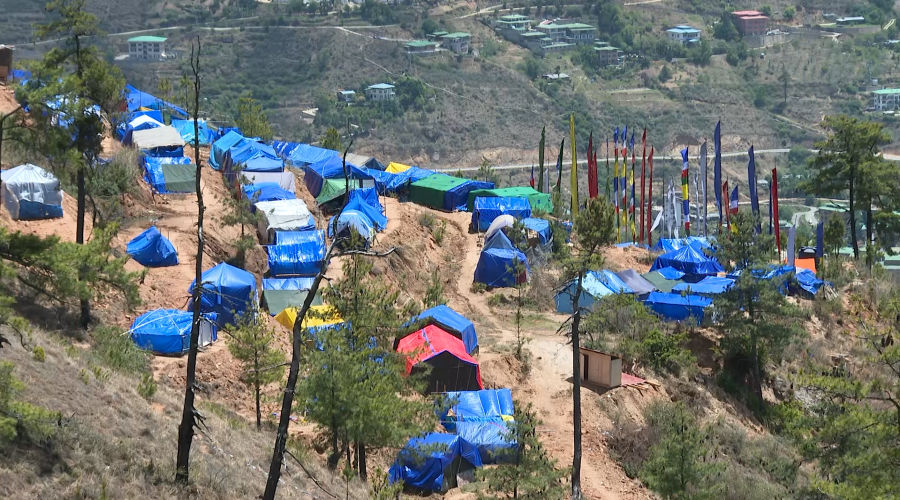 Thousands of devotees are receiving the month-long Nyingthig Yazhi oral transmission and empowerment at Kuenselphodrang in Thimphu. While the religious event is drawing crowds, some campers are unhappy with the poor amenities. Despite paying fees between Nu 1,900 and 2,500 for basic services, some of them have yet to receive electricity and water connections, and a toilet facility.
Thousands of devotees are receiving the month-long Nyingthig Yazhi oral transmission and empowerment at Kuenselphodrang in Thimphu. While the religious event is drawing crowds, some campers are unhappy with the poor amenities. Despite paying fees between Nu 1,900 and 2,500 for basic services, some of them have yet to receive electricity and water connections, and a toilet facility.
More than a thousand camps have been set up in the area. Out of them, about 60 are without electricity, water and a toilet.
Campers say they paid substantial fees expecting these services.
“It has been three nights since we arrived. There is no water, no electricity, and no toilets. We don’t know who to turn to,” said Tashi, a devotee in Thimphu.
Gerab Nyed-Yon Limited is overseeing the event, which allocates the land at Kuenselphodrang to religious event organisers. According to the entity, the land is leased at minimal rates to the event organiser, who in turn appointed two private individuals to provide the services.
“The general public believes that Gerab Nyed-Yon has collected large fees. However, we have not collected those fees. We only charged the organisers Nu 1 per square foot for managing the land, forest, and waste,” said Kuenley Gyeltshen, Estate Manager, Gerab Nyed-Yon Ltd.
He added that the service providers are responsible for installing toilets for every 10 tents and water taps for every 20 tents.
“We have about 30 to 40 households living here. Now, they are saying we won’t get water or electricity and are asking us to dismantle our tents. But in the beginning, they promised us water, electricity, and toilets,” said a devotee.
“This time, we are being asked to pay Nu 3,000 even after building our tents without any toilets or electricity,” said Pem, a devotee from Punakha.
“We have built a decent tent, but there’s no water or electricity, which is causing a lot of inconvenience. We are not the only ones facing this—many others are going through the same. It would really help if the authorities could look into the issue,” said Kinzang Wangmo, a devotee from Trashigang.
“It’s been four days since my daughter registered the plot and set up our tent. Despite paying the fees, we still don’t have water or electricity. We can manage by building our own toilet, but now we are being told to dismantle our tent,” said Chador Wangmo, a devotee from Punakha.
“Although they are trying to electrify the tents, the main issue remains the lack of toilets and clean drinking water,” said Tshencho Gyalpo, a devotee from Paro.
The private service providers said they are doing their best under difficult conditions, citing time constraints, steep terrain, and unplanned expansion beyond the original zones.
“There were time constraints, and space was also a challenge. The area isn’t ideal for people to stay, and proper facilities couldn’t be set up. The three types of plots that were allotted weren’t suitable for living. Had it been otherwise, we could have provided the necessary facilities and services,” said Phuntsho, Service Provider, Kuenselphodrang, Thimphu.
He added that they refunded about 400 people who opted to leave and admitted that some areas remain without proper service.
There are only a limited number of toilets and water supply points—some of which don’t even have running water. As a result, the sanitation of existing toilets has deteriorated, with long queues forming throughout the day.
The area is also littered with waste such as plastic bottles and tissue paper. With no proper facilities available, many people are forced to defecate in the nearby forest.
According to the service providers, over Nu 3.5 M has been spent on setting up essential services, including the purchase and installation of electrical appliances, a transformer, daily water tanker services, water tanks, water pipes, toilets, and landscaping.
They also have to pay about Nu 250,000 to Gerab Nyed-Yon for land usage. Initially, only three areas were allocated for tents, but due to the overwhelming number of devotees, five zones were eventually created.
They said they are working to provide electricity to tents located outside the designated zones. However, they claimed that supplying water to those areas is not feasible due to the steep terrain.
As the retreat continues, devotees are calling on authorities and service providers to step in and resolve the sanitation and infrastructure gaps.
Karma Wangdi & Kelzang Chhophyel
Edited by Kipchu









